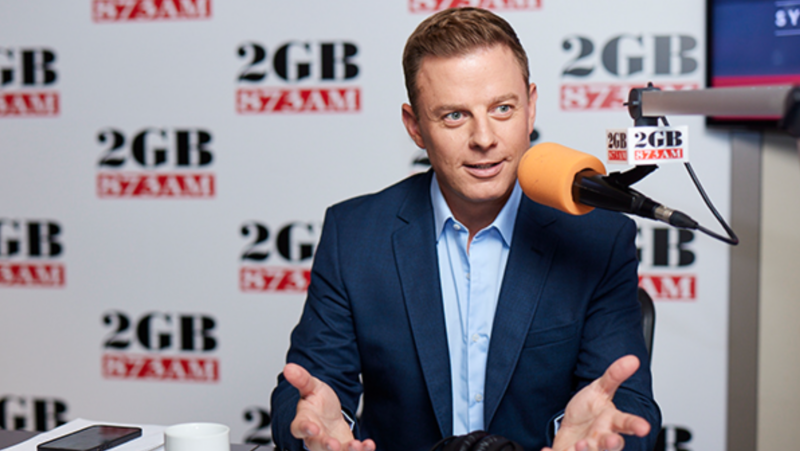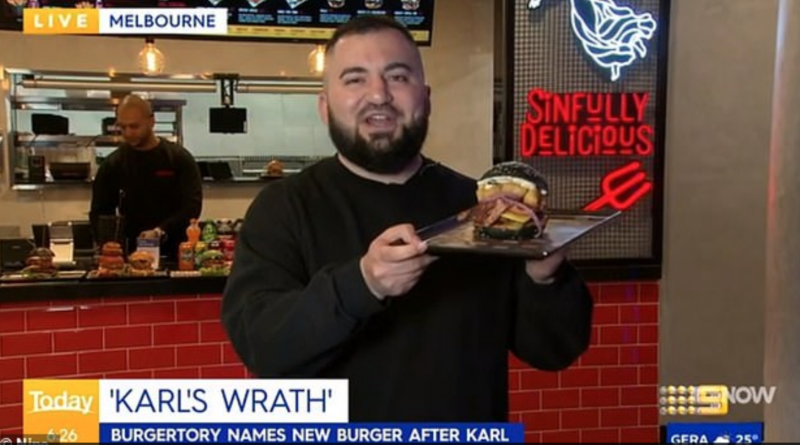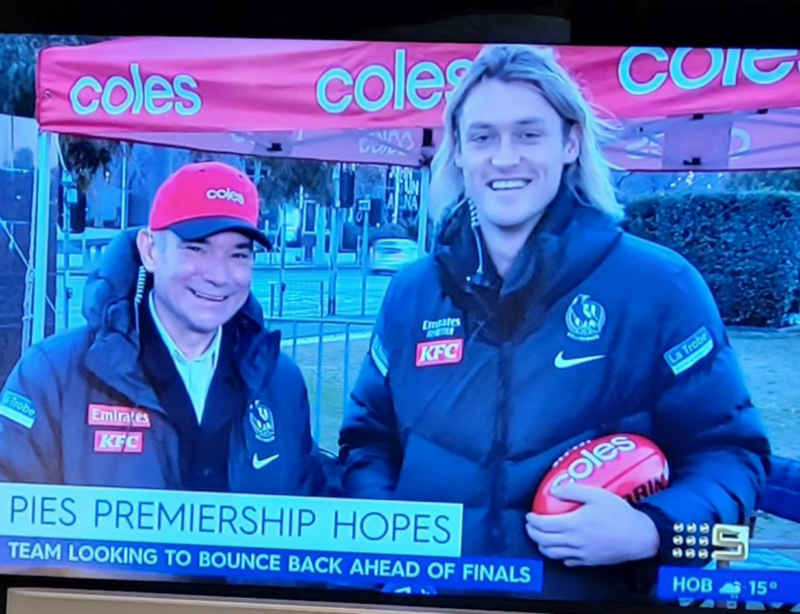Party like it’s 1999, ‘cos talkback radio has a new cash-for-comment scandal!
During the week, the Australian Communications and Media Authority (ACMA) found that Nine Radio, meaning Sydney’s 2GB and Melbourne’s 3AW, breached broadcasting rules by failing to disclose advertising agreements between their presenters and companies featured in their current affairs programs.
Ben Fordham, host of Sydney’s top-rating breakfast show on 2GB, was overly excited about undisclosed sponsor, Uber, during a show last August, while over in Melbourne on 3AW Afternoons that same month, BMW was flavour of the day.
The ACMA ruled the penalty for the breach would be that the “relevant current affairs presenters, producers and sales staff undertake formal training on the commercial disclosure requirements”. So, a training half-day, with some nice wraps and muesli cups from that place up the road? Pretty good deal, considering.

Nine didn’t think so, blasting back with the classic woe-is-me defence.
“The Disclosure Standard was introduced 24 years ago to prevent broadcasters from passing commercial content as editorial content,” Nine Radio wrote in a statement to Mumbrella.
This is true. It was caused by one of Nine Radio’s talkback stations. More on that in a bit.
“It only applies to commercial radio programs whose substantive purpose is to provide interviews, analysis, commentary or discussion, including open‑line discussion with listeners, about current social, economic or political issues.”
Also true. They point out that sports and entertainment radio shows are exempt from these disclosure laws, as are music stations and the ABC – who aren’t running Beamer ads last time I checked.
“Listeners to commercial music stations would have no idea if what they are listening to is editorial or advertorial,” the Nine Radio statement continues.
“Listeners to the ABC would have no idea if a broadcaster has a vested interest, or if the station has a promotional agreement with a local festival or event.
“Only Nine’s radio stations are obliged to make the appropriate disclosures.”
They then talk about how logging all these commercial deals is “heavily onerous, relying on “constant vigilance to determine news content from sport or entertainment content, and define broadcasters as either full time or part time.” Nothing worse than vigilance, hey?
Enough.
Now, The Disclosure Standard was introduced 24 years ago because of a fun 1999 scandal known as Cash for Comment starring 2UE’s biggest stars, Alan Jones and John Laws. Remember?

A Media Watch exposé discovered that the pair had been receiving money in exchange for making favourable comments about a rollcall of Australia’s biggest companies and organisations: the Australian Banking Association, Qantas, Optus, Foxtel, the Star, Rams Home Loans, Australian Trucking Association, and others.
Or rather, they received money to basically stop flinging mud at these entities. It was closer to hush money than promotional payments – even if it ends up being basically the same thing.
Laws was rallying at length about the glut of gambling and gaming in the state until he was financially incentivised by the Star Casino to say otherwise. And so on, depending which industry you’re in.
The faint whiff of mob standover tactics made this scandal all the more juicy to the media. That it involved radio’s two biggest names has ensured it has stuck around.
Laws, Jones, and 2UE were found to have committed 90 breaches of the industry code, worth an estimated $18 million according to the Australian Broadcasting Authority, who fined the station $360,000.
Amusingly, the Guardian reported at the time: “Their future at the station is now uncertain.”
Not surprisingly, 2UE paid the fines, kept the two most-lucrative names in talkback radio on the airwaves, and the aforementioned sponsor disclosure requirements that Nine Radio complained about this week dribbled into law.
The disdain in which these regulations were (and are) treated is best demonstrated by the fact that Laws would strike a cow bell before launching into a diatribe about how wonderful the QANTAS warm towels are, or whatever he happened to be shilling, in order to make clear the commercial imperative behind his golden recommendation.
Of course, Nine Radio didn’t own 2UE back then. The family of early media mogul John Lamb did. Then Southern Cross did. Then Fairfax did. Then Nine did. But when you buy a company, you assume their debts – and the karmic debt that Nine bought was the cash for comments scandal. Which is why they are held to such strict regulations in the talkback radio world.
Of course, the entire history of music radio revolves around payola; and as Nine pointed out in their complaint, music-based radio still isn’t regulated heavily in this regard – but the neat alliteration of ‘cash for comment’ and Alan Jones and John Laws’ continued fame has ensured the scandal has stayed if not front, then semi-back-of the collective public mind for the last quarter-century.
And now Ben Fordham, Nine Radio’s most successful talkback talent, host of 2GB Sydney breakfast, friend of nans and tradies alike, the highest-rating Sydney voice, has been caught out for spruiking the joys of Uber. Oh, dear!
It could be a catastrophe. Especially if Nine go on the defensive and inspire weekend pieces such as this. But it won’t make a blip.
Because, I have to say – Nine do have a very good point.
In 2024, in the world of #sponcon and Suncorp Stadium and persuasive news articles being brought to you by protein powder startups, and finfluencers and gymfluencers and G Flip performing at a Pepsi-branded fashion show, these disclosure laws seem quant.
They do also seem heavily aimed at talkback radio – which makes sense, considering it was talkback radio the laws were invented to rein in.
But in 1999, when these laws were introduced, the internet looked like this.

Or, for the rom-com fans.

Given the insane levels of payola at radio stations until at least the late 1990s (I have been told by the producer of a multi-platinum Aussie album from that era that even triple j presenters weren’t above such antics), 1999 probably, in retrospective, was the nadir of the pay to play, cash for comment era. Or the peak, however you look at it.
Maybe that’s why it seemed so shocking that John Laws had secret business deals with the Registered Clubs Association of New South Wales.

Who would have though John Laws could be bought?
Paul Barry and Media Watch still regularly take Nine, Ten and Seven’s breakfast and morning shows to task over blatant product plugs, but it barely makes a ripple.
Today has been slammed numerous times by the show for not disclosing commercial agreements from newsworthy companies such as McDonald’s, and ABC Learning (the McDonald’s of childcare franchises), both of which Karl Stefanovic took an uncharacteristically enthusiastic interest in.
Karl even went so far as to declare the McChicken “the best burger I’ve ever had”, which, for a man with multiple burgers named after him, is the biggest red flag of all that something is amiss here.


In 2020, Seven’s The Morning Show ran a 7-minute segment in which the diverse wonders of Big W’s catalogue was discussed, without mentioning if any money exchanged hands, for which the ACMA slapped them down.
As Paul Barry raged at the time, Studio 10 managed to dodge a disclosure fine that same year when they presented a cooking segment where the key ingredient was “the brand-new caramel Violet Crumble, which is delicious”. As Barry raged: “The only disclosure was hidden away in the credits, two hours later. And even then you had to know ‘Robern Menz’ were makers of the chocolate bar.”
The ACMA code allows this, Barry explains, as mentioning this in the credits or even on the pumping online hub that is the Studio 10 website, is enough of a viewer disclosure that you just watched a paid advertorial, and not a serious piece of news journalism about a new confectionary variant.
Barry’s rage aside, is anyone seriously surprised that commercial content creeps into Today, or The Morning Show, or indeed Ben Fordham Live? Does anyone go to these places for impartial information? Was anyone tricked into buying a BMW by what they thought was a serious and thorough product review at 4.15pm on a talkback radio show?
Look at this photo I snapped in late July from Today.

Hilarious, right? I only took the photo because it was such blatant Coles placement as to be laughable, much like those Valvoline ads John Laws did in the 1980s.
But I wasn’t concerned by the moral breach. As i said, it’s laughable. In 2024, any advertisement that isn’t based on a biometric evaluation of my deepest desire and fears feels rather harmless and quant. You know what I mean?
Now, I’m running late. Luckily, Uber offers fantastic daytime deals to get you where you need to be.
Enjoy your weekend.




 Linkedin
Linkedin
don’t think this is the end of the story on this. a little bit more digging around 2GB’s arrangements will expose many more issues like this uber deal and money ending up not in company coffers
User ID not verified.
Have your say